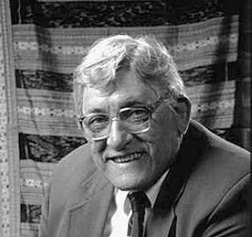
Herbert P. Phillips
Professor of Anthropology, Emeritus
Herbert Phineas Phillips was born on July 4, 1929 in Boston. Aware that he shared a birthday with his native country, and spurred on by patriotic spirit, he joined the army at age 17. Shortly after World War II he spent a tour of duty in Japan, where he developed a love for and interest in Asia, a continent that over following decades became the geographic focus of his research. Using the G.I. Bill he attended Harvard University, and went on to graduate school in anthropology at Cornell, in a department then known for its strength in Southeast Asian studies.
Herbert Phillips spent three decades, from 1964 to 1994, on the faculty of the Department of Anthropology at the University of California, Berkeley. Over that period, his teaching and research interests evolved significantly, while at the same time remaining firmly within the study of Thailand, the country to which he devoted his life’s work. During the 1960s his work supported and stimulated the expansion of cultural anthropology into the domain of comparative peasant studies. His major ethnography, Thai Peasant Personality: The Patterning of Interpersonal Behavior in the Village of Bang Chan (University of California Press, 1965), resulted from a lengthy period of fieldwork among rice farmers. This work opened a spirited, ongoing debate about dominant personality traits in Thailand, which he argued were designed to promote and maintain individuality, privacy, and an elevated sense of self-regard. The book contributed significantly to the then-thriving academic field of culture and personality. It also outlined research methods and analytical frameworks that could advance the cross-cultural investigation of peasant personality. Through multiple essays and book chapters published in numerous anthropological volumes, Professor Phillips’s work on Thai peasant personality became an integral part of the standard repertoire of academic readings concerning the role of the individual in society.
In the latter part of his career, Herbert Phillips turned toward the exploration of humanistic themes in anthropology, first literature, then painting and drawing. His course offerings reflected these new interests as well. In 1987, he published Modern Thai Literature: With an Ethnographic Interpretation (University of Hawaii Press), followed in 1992 by his book The Integrative Art of Modern Thailand (University of California Press). The latter volume—a highlight of his career—showcases the work of 28 contemporary artists, with commentaries on each of their life stories. It also contains ethnographic information about social relations among artists and their communities in contemporary Thailand. Among other themes in the book, Professor Phillips highlights the ways in which each artist deals aesthetically with the tension between indigenous Thai aesthetic traditions and the increasingly dominant and culturally invasive universalistic standards of artistic production. This beautifully produced volume serves as the catalog of an exhibition of contemporary Thai art that Professor Phillips organized and that travelled to galleries and museums throughout the United States. In this work, he pushed anthropology beyond the bounds of native folk and tourist art—a genre that is almost always produced by anonymous artisans--to the realm of original, signed fine art paintings and drawings.
In his pedagogic role, Phillips offered diverse courses on Culture and Personality, Southeast Asia, Art and Anthropology, Literature and Anthropology and related topics. He was an active supporter of the Athletic Study Center on the Cal campus, and became faculty mentor to numerous athletes, particularly those in the football program of which he was a loyal fan.
On a personal note, while I was looking for employment in a tight job market in 1970, Professor Phillips helped me secure my first academic appointment at Michigan State University. He did this for me despite the fact that I had never enrolled in any of his courses and in fact had only the most fleeting contact with him. I have always taken this as a sign of a generous spirit. Later, in my role as young colleague, he consistently read and supported my writing, most of it in fields far removed from his own.
Herbert Phillips passed away on May 22, 2018. He is survived by his wife, Barbara Haxo Phillips; sister Harriet P. Lefley; daughters Kathe Maguire, Elizabeth Bravo, Heather Phillips, and Claire Phillips; son Jon Phillips; sons-in-law Chris Maguire, Reed Smoller, Bashir Anastas, and Chad Hanson; as well as seven grandchildren and step-grandchildren.
Stanley Brandes
2021
